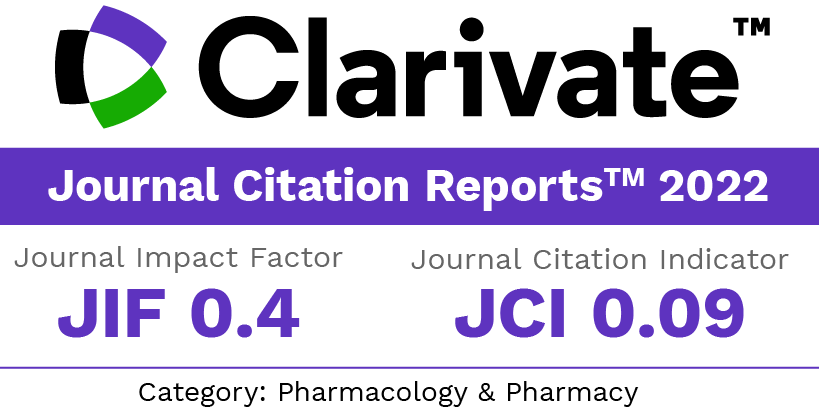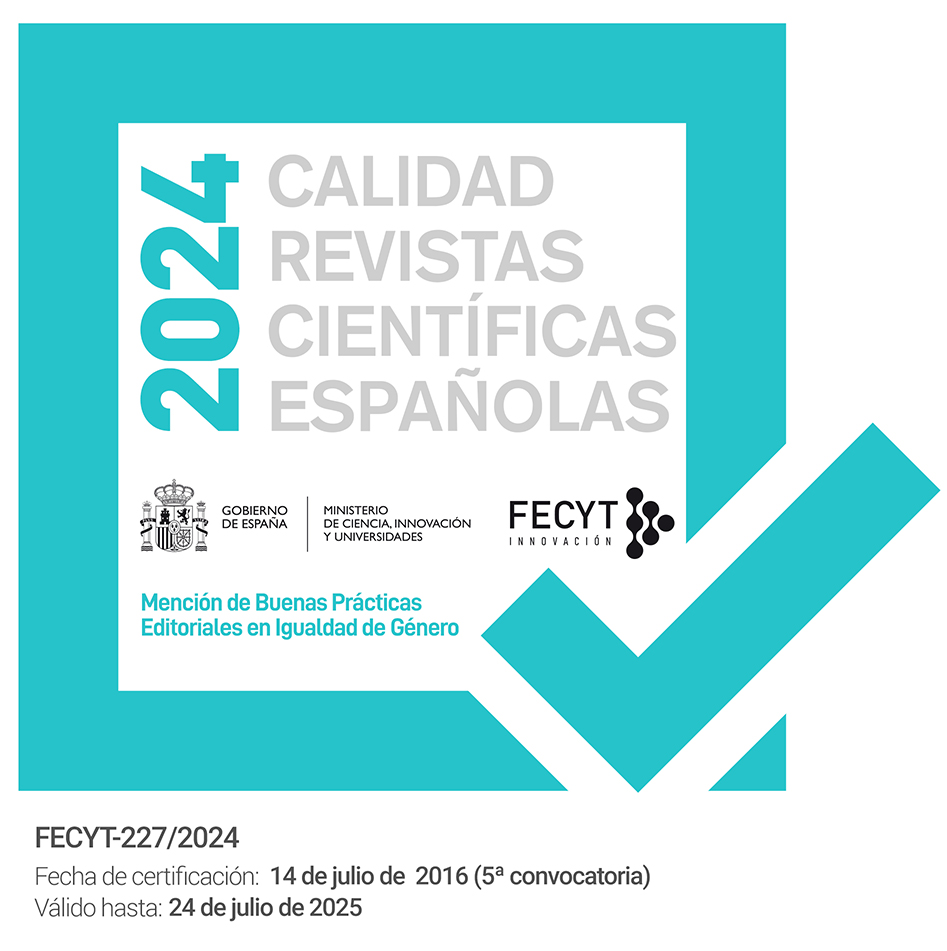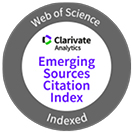A new path in Pharmaceutical Care: the fitness of Objective Structured Clinical Evaluation
DOI:
https://doi.org/10.30827/ars.v63i3.24104Keywords:
Education Pharmacy; Competency-Based Education; Objective Structured Clinical Examination; Pharmaceutical Care; Educational Innovation.Abstract
Introduction: Objective Structured Clinical Evaluation (OSCE) is a novel and best-performing tool in the evaluation of clinical competencies. Its use in Pharmacy represents an opportunity to innovate and improve the teaching-learning process.
Method: The implementation process was structured in two stages: 1) Preparation phase, which included the theoretical design and practical planning of the OSCE test with three key components (Organizing Committee, Map of Competencies and Table of Specifications and Selection of Cases and Design of Stations) and the practical planning with the assembly of the test; 2) Phase of execution and evaluation of results.
Results: The pilot study was carried out at the School of Pharmacy (University of Granada, Spain) in the 2018-2019 academic year, and 33 undergraduate students and 14 Master students participated. Five competencies were evaluated: Clinical, Technical, Pharmaceutical Services, Communication and Educational activities, delivered in five stations, three with simulated standardized patients and two written stations. Material, human and economic resources were identified. The necessary material, human and economic resources were identified, the documents for each station were prepared and the participants were selected and trained.
Conclusions: OSCE is a suitable and great tool for evaluating the specific competencies of Pharmaceutical Care. The procedure and key elements identified facilitate the implementation of this type of innovative tests in Pharmacy.
Downloads
References
Faus MJ, Amariles P, Martínez-Martínez, F. Atención Farmacéutica. Servicios farmacéuticos orientados al Paciente. 2ª ed. Granada: Fleming y Técnica Avican; 2022.
Foro de Atención Farmacéutica en Farmacia Comunitaria. Servicios profesionales farmacéuticos asistenciales: definición y clasificación. Panorama Actual del Medicamento. 2016; 40(395): 709-711.
International Pharmaceutical Federation - FIP Education Initiatives. A Global Competency Framework for Services Provided by Pharmacy Workforce; 2012 [acceso 2 de marzo de 2022] Disponible en: https://www.fip.org/files/fip/PharmacyEducation/GbCF_v1.pdf
Martínez-Clares P, Martínez-Juárez M, Muñoz-Cantero J. Formación basada en competencias en educación sanitaria: aproximaciones a enfoques y modelos de competencia. RELIEVE - Revista Electrónica De Investigación Y Evaluación Educativa. 2008; 14(2):1-23. Doi: 10.7203/relieve.14.2.419.
Koster A, Schalekamp T, Meijerman I. Implementation of Competency-Based Pharmacy Education (CBPE). Pharmacy. 2017; 5(4):10. Doi: 10.3390/pharmacy5010010.
Salinas J. Innovación docente y uso de las TIC en la enseñanza universitaria. Revista de Universidad y Sociedad del Conocimiento (RUSC). 2004;1:1-16. Doi: 10.7238/rusc.v1i1.228.
Montes de Oca Recio N, Machado Ramírez EF. Estrategias docentes y métodos de enseñanza-aprendizaje en la Educación Superior. Humanidades Médicas. 2011;11(3):475-488. Disponible en: http://scielo.sld.cu/pdf/hmc/v11n3/hmc05311.pdf
Raiyn J. The role of visual learning in improving students’ high-order thinking skills. Journal of Education and Practice. 2016;7(24):115–121.
Fernández March A. La evaluación orientada al aprendizaje en un modelo de formación por competencias en la educación universitaria. REDU. Revista De Docencia Universitaria. 2011; 8(1):11. Doi: 10.4995/redu.2010.6216.
Miller G. The assessment of clinical skills/competence/performance. Academic Medicine. 1990; 65(9):S63-7. Doi: 10.1097/00001888-199009000-000450.
van der Vleuten C, Schuwirth L. Assessing professional competence: from methods to programmes. Medical Education. 2005; 39(3):309-317. Doi: 10.1111/j.1365-2929.2005.02094.x.
Khan K, Ramachandran S, Gaunt K, Pushkar P. The Objective Structured Clinical Examination (OSCE): AMEE Guide No. 81. Part I: An historical and theoretical perspective. Medical Teacher. 2013; 35(9):e1437-e1446. Doi: 10.3109/0142159x.2013.818634.
Harden R, Gleeson F. Assessment of clinical competence using an objective structured clinical examination (OSCE). Medical Education. 1979; 13(1):39-54. Doi: 10.1111/j.1365-2923.1979.tb00918.x.
Serdio Romero E. ECOE: Evaluación Clínica Objetiva Estructurada. I. Competencias y su evaluación. Medicina de Familia (And). 2002; 1:49-52.
Serdio Romero E. ECOE: Evaluación Clínica Objetiva Estructurada. II. Diseño de una ECOE. Medicina de Familia (And). 2002; 2:127-132.
Serdio Romero E. ECOE: Evaluación Clínica Objetiva Estructurada. III. Montaje y desarrollo de una ECOE. Medicina de Familia (And). 2002; 4:277-281.
Khan K, Gaunt K, Ramachandran S, Pushkar P. The Objective Structured Clinical Examination (OSCE): AMEE Guide No. 81. Part II: Organisation & Administration. Medical Teacher. 2013; 35(9):e1447-e1463. Doi: 10.3109/0142159x.2013.818635.
Croft H, Gilligan C, Rasiah R, Levett-Jones T, Schneider J. Current Trends and Opportunities for Competency Assessment in Pharmacy Education–A Literature Review. Pharmacy. 2019; 7(2):67. Doi: 10.3390/pharmacy7020067.
García-Puig J, Vara-Pinedo F, Vargas-Núñez J. Implantación del Examen Clínico Objetivo y Estructurado en la Facultad de Medicina de la Universidad Autónoma de Madrid. Educación Médica. 2018; 19(3):178-187. Doi: 10.1016/j.edumed.2017.01.003
Ramos J, Martínez-Mayoral M, Sánchez-Ferrer F, et al. Análisis de la prueba de evaluación clínica objetiva estructurada (ECOE) de sexto curso en la Facultad de Medicina de la Universidad Miguel Hernández de Elche. Educación Médica. 2019; 20:29-36. Doi: 10.1016/j.edumed.2017.07.020.
Aronowitz T, Aronowitz S, Mardin-Small J, Kim B. Using Objective Structured Clinical Examination (OSCE) as Education in Advanced Practice Registered Nursing Education. Journal Of Professional Nursing. 2017; 33(2):119-125. Doi: 10.1016/j.profnurs.2016.06.003.
Bdair I, Abuzaineh H, Burqan H. Advantages and Disadvantages of the Objective Structured Clinical Examination OSCE in Nursing Education: A Literature Review. International Journal Of Trend In Scientific Research And Development. 2019; 3(2): 270-274. Doi: 10.31142/ijtsrd20269.
Zarzuelo MJ, Valverde-Merino MI, Fernández-Rodriguez M, et al. Results of Development and Application of an Objective Structured Clinical Examination: A Pioneering Experience in Pharmaceutical Care. Indian Journal of Pharmaceutical Education and Research. 2021; 55(2):621-628.
Corbo M, Patel J, Abdel Tawab R, Davies J. Evaluating clinical skills of undergraduate pharmacy students using objective structured clinical examinations (OSCEs). Pharmacy Education. 2006; 6(1):53-58. Doi: 10.1080/15602210500528372
ORDEN CIN/2137/2008, de 3 de julio, por la que se establecen los requisitos para la verificación de los títulos universitarios oficiales que habiliten para el ejercicio de la profesión de Farmacéutico. Boletín Oficial del Estado. 2008.
Universidad de Granada. Plan de Ordenación Docente 2019-2020 de la Facultad de Farmacia de Granada. Disponible en: https://farmacia.ugr.es/pod/2020/
Foro de Atención Farmacéutica en Farmacia Comunitaria. 2017. Propuesta de contenidos específicos en Atención Farmacéutica. Madrid: Consejo General de Colegios de Farmacéuticos.
Sánchez Cañizares SM, Santos Roldán L, Fuentes García FJ, Núñez Tabales JM. Enseñanza-Aprendizaje por competencias en la Educación Superior. La construcción de casos de Empresa. Educación XX1. 2015; 18(1):237-258. doi: 10.5944/educXX1.18.1.12319.
Austin Z, Gregory P, Tabak D. Simulated Patients vs. Standardized Patients in Objective Structured Clinical Examinations. American Journal Of Pharmaceutical Education. 2006; 70(5):119. Doi: 10.5688/aj7005119.
Andrés Trejo-Mejía J, Blee-Sánchez G, Peña-Balderas J. Elaboración de estaciones para el examen clínico objetivo estructurado (ECOE). Investigación En Educación Médica. 2014; 3(9):56-59. Doi: 10.1016/s2007-5057(14)72725-5.
Kristina S, Wijoyo Y. Assessment of Pharmacy Students’ Clinical Skills using Objective Structured Clinical Examination (OSCE): A Literature Review. Systematic Reviews In Pharmacy. 2018; 10(1):55-60. Doi: 10.5530/srp.2019.1.9.
Curtis S, Smith K, Taylor J. Implementation of objective structured clinical examinations (OSCEs) in a doctor of pharmacy program. Currents In Pharmacy Teaching And Learning. 2019;11(8):832-837. Doi: 10.1016/j.cptl.2019.04.011.
Rodríguez Gómez G, Ibarra Saiz MS, Cubero Ibáñez J. Competencias básicas relacionadas con la evaluación. Un estudio sobre la percepción de los estudiantes universitarios. Educación XX1. 2018; 21(1):181-208, Doi: 10.5944/educXX1.20184.
Gleason B, Peeters M, Resman-Targoff B, et al. An Active-Learning Strategies Primer for Achieving Ability-Based Educational Outcomes. American Journal Of Pharmaceutical Education. 2011; 75(9):186. Doi: 10.5688/ajpe759186.
Pedersen K, Moeller M, Paltved C, et al. Students’ Learning Experiences from Didactic Teaching Sessions Including Patient Case Examples as Either Text or Video: A Qualitative Study. Academic Psychiatry. 2017; 42(5):622-629. Doi: 10.1007/s40596-017-0814-1.
Downloads
Published
How to Cite
Issue
Section
License
Copyright (c) 2022 Maria Jose Zarzuelo Romero

This work is licensed under a Creative Commons Attribution-NonCommercial-ShareAlike 4.0 International License.
The articles, which are published in this journal, are subject to the following terms in relation to the rights of patrimonial or exploitation:
- The authors will keep their copyright and guarantee to the journal the right of first publication of their work, which will be distributed with a Creative Commons BY-NC-SA 4.0 license that allows third parties to reuse the work whenever its author, quote the original source and do not make commercial use of it.
b. The authors may adopt other non-exclusive licensing agreements for the distribution of the published version of the work (e.g., deposit it in an institutional telematic file or publish it in a monographic volume) provided that the original source of its publication is indicated.
c. Authors are allowed and advised to disseminate their work through the Internet (e.g. in institutional repositories or on their website) before and during the submission process, which can produce interesting exchanges and increase citations of the published work. (See The effect of open access).























